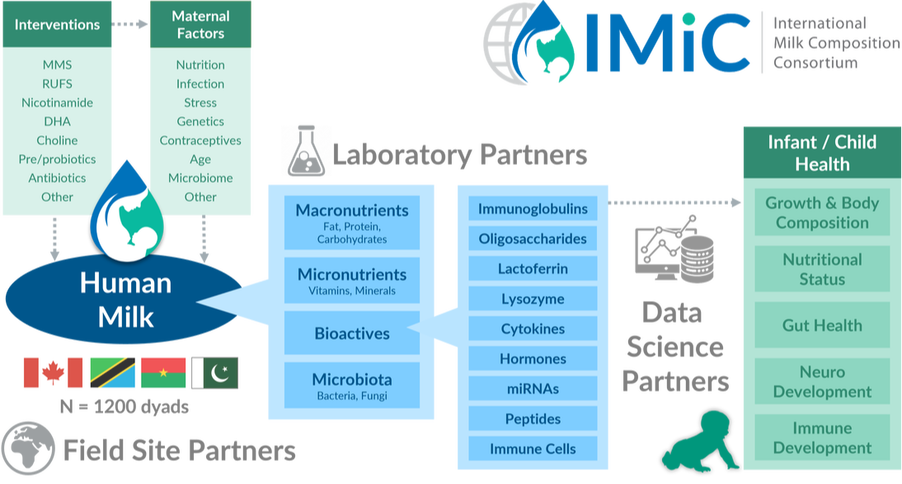Breastfeeding provides optimal nutrition and immune protection to infants. Human milk contains a plethora of nutritional and non-nutritional compounds that support infant growth and development. Many are highly variable between and within mothers, but little is known about the source and impact of this variation – yet, this information is critical to understanding 1) why some breastfed infants still fail to achieve optimal growth trajectories, and 2) how to optimize nutrition for infants who cannot be breastfed.
The International Milk Composition (IMiC) Consortium was established in 2020 to unite maternal-child health and human milk researchers with statistical experts to co-develop a harmonized approach to human milk analysis.
The International Milk Composition (IMiC) Consortium was established in 2020 to unite maternal-child health and human milk researchers with statistical experts to co-develop a harmonized approach to human milk analysis.
The IMiC Consortium will analyze milk from 1200 mother-infant dyads across 4 diverse settings (Tanzania, Pakistan, Burkina Faso and Canada). Samples will be stored centrally at the Manitoba Interdisciplinary Lactation Centre (MILC) Biorepository and distributed to multiple laboratories for analysis of macronutrients, micronutrients, oligosaccharides, growth factors, immunoglobulins, cytokines, metabolites and microbes. Data will be harmonized and stored in a central database, and diverse statistical methods will be applied for data integration and analysis.
The overarching objective of the IMiC Consortium is to identify, comprehensively, human milk components linked to infant growth and resilience to inform maternal, newborn and infant nutrition recommendations and interventions.
Our questions include:
Learn more about The IMiC Team here.
The overarching objective of the IMiC Consortium is to identify, comprehensively, human milk components linked to infant growth and resilience to inform maternal, newborn and infant nutrition recommendations and interventions.
Our questions include:
- What are the ranges and distributions of human milk components between women and across settings?
- How are different human milk components correlated with each other?
- How is human milk composition associated with maternal, environmental and sociodemographic factors?
- How is human milk composition impacted by maternal health and nutritional interventions?
- How does human milk composition influence infant health, growth and development?
Learn more about The IMiC Team here.
IMiC in the News
- Natalie Rodriguez, IMiC Operations Director, wins CBC Manitoba Future 40 Award
- Coverage of the IMiC launch on CBC
- Story about Dr. Azad and IMiC by Research Manitoba
- Gates Foundation grant places U of M at forefront of global human milk research - The Manitoban
The IMiC Consortium is Directed by Dr. Meghan Azad and funded by a US$5,000,000 investment from the Bill and Melinda Gates Foundation Maternal, Newborn & Child Health Strategy.





